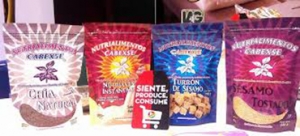SHANGHAI, Nov.8 (Xinhua) – Mijail Loredo, the general manager of the Bolivian company AgroExport, arrived at the China International Import Expo (CIIE) with some 40 kilos of samples of sesame, chia and chiquitana almonds, which were sold out practically in a day.
The businessman chose to save a part to be able to offer a number of his products to potential partners who visit his stand after the success they had on Tuesday and that left him eight kilos three days after the closing of the fair.
On the opening day, November 5, in which Chinese President Xi Jinping delivered a keynote address and there were visits from government representatives from different countries, the influx to this post was low, but the next day Loredo To his “surprise” he found that many people asked him for samples and took his information brochures and contact cards.
“So much so that the first day we ran out of everything,” he told Xinhua. In order to continue offering information, he had to photocopy the information leaflet that explains the properties of the grains and seeds that his company offers.
In the exhibition he is presenting chía, a typical Bolivian almond from the Chiquitanía area and sesame. “I tell you that it is the sweetest sesame in the world,” he said and explained that the conditions of the soil and the variety of the seed are what make it taste that way.
Visitors “want to taste and know.” “Although there is some face that tells me that Chinese sesame tastes better, I don’t believe it,” he joked. These seeds are the ones that generate the most interest among those who come to the Loredo stand, who believes Bolivia should produce more and seek a niche in the Asian country’s market.
Sesame consumption in China is, he said, 1.2 million tons and Bolivian production, 5,000 tons. “That is the idea, entering this big market. Participating in a small quota would be very good for us,” he said.
His company has already managed to close a contract with a Chinese firm to export black sesame. The merchandise will be transformed to produce derivatives.
Loredo also offers chía at the fair. Bolivia, he stressed, is one of the markets that produces the most this seed and aspires to enter the “huge” Chinese market, which still does not consume much of it. Currently there are phytosanitary restrictions on which there are negotiations, he explained.
The long days at his small stand leave a collection of novel impressions for this businessman. “When someone approaches to take a sample or try it, it seems that this automatically calls people and the booth fills up and you can’t cope with serving them,” he reflected and added that Chinese entrepreneurs interested in his products take the initiative to sit in the table you have placed in your place. “It’s their way of saying they are interested.”
To overcome the difficulties posed by not speaking the same language, Loredo uses a translation tool on his phone and has been learning these days to say hello in Chinese and some words related to his products. The businessman believes that language is one of the aspects to be taken into account in trade relations with China.
All these experiences, he emphasizes, give him the opportunity to learn. His conclusion is that he wants to be present at the next edition of the CIIE. “And hopefully next year we come not with 40, but with 80 kilos.”
Source: http://spanish.xinhuanet.com/2018-11/08/c_137592325.htm



